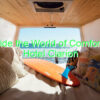In the competitive landscape of the hospitality industry, maximizing occupancy rates is crucial for success. Booking Extranet Hacks offer innovative strategies and tools that empower property owners and managers to optimize their listings, enhance visibility, and attract more guests. By leveraging these hacks, you can streamline your booking process, improve your property’s appeal, and ultimately drive higher occupancy rates. This guide will explore effective techniques to harness the full potential of the Booking Extranet, ensuring your property stands out in a crowded market and meets the demands of today’s travelers.
Optimize Your Property Listing for Maximum Visibility
When it comes to maximizing your occupancy rate, one of the most effective strategies is to optimize your property listing for maximum visibility. In the competitive world of online bookings, standing out is essential, and a well-crafted listing can make all the difference. To begin with, high-quality images are crucial. Potential guests are drawn to visually appealing photos that showcase your property’s best features. Invest in professional photography to capture the essence of your space, highlighting not only the rooms but also the amenities and unique aspects that set your property apart. Remember, a picture is worth a thousand words, and in the realm of online bookings, it can be the deciding factor for many travelers.
In addition to stunning visuals, the description of your property plays a vital role in attracting potential guests. It’s important to write a compelling and informative description that not only outlines the features of your property but also conveys the experience guests can expect. Use descriptive language to paint a vivid picture, and don’t shy away from including local attractions and activities that might entice visitors. By providing context about the surrounding area, you can appeal to guests looking for a complete travel experience rather than just a place to stay.
Moreover, utilizing keywords effectively can significantly enhance your listing’s visibility in search results. Think about the terms potential guests might use when searching for accommodations and incorporate these keywords naturally into your title and description. This practice not only helps in search engine optimization but also ensures that your listing appears in relevant searches, making it easier for travelers to find you. However, it’s essential to strike a balance; overloading your description with keywords can make it sound unnatural and deter potential guests.
Another important aspect of optimizing your property listing is ensuring that all information is accurate and up-to-date. This includes details about pricing, availability, and amenities. Guests appreciate transparency, and providing clear, concise information can help build trust. If there are any changes to your property or its offerings, be sure to update your listing promptly. This not only helps avoid misunderstandings but also enhances your credibility as a host.
Furthermore, consider leveraging guest reviews to your advantage. Positive reviews can significantly influence potential guests’ decisions, so encourage satisfied visitors to leave feedback. Highlighting these reviews in your listing can provide social proof and reassure prospective guests about the quality of their stay. Additionally, responding to reviews—both positive and negative—demonstrates your commitment to guest satisfaction and can enhance your reputation.
Lastly, don’t overlook the importance of competitive pricing. Research similar properties in your area to ensure your rates are attractive while still reflecting the value you offer. Consider implementing dynamic pricing strategies that adjust rates based on demand, seasonality, and local events. This approach can help you remain competitive and maximize your occupancy rate throughout the year.
In conclusion, optimizing your property listing for maximum visibility involves a combination of high-quality visuals, compelling descriptions, effective keyword usage, accurate information, leveraging guest reviews, and competitive pricing. By focusing on these elements, you can significantly enhance your property’s appeal and attract more guests, ultimately boosting your occupancy rate. With a little effort and attention to detail, you can transform your listing into a powerful tool for success in the bustling world of online bookings.
Q&A
**Question:** What are some effective hacks to boost occupancy rates using the Booking Extranet?
**Answer:**
1. **Optimize Your Listings:** Ensure that your property descriptions are detailed and engaging, highlighting unique features and amenities.
2. **Use High-Quality Photos:** Invest in professional photography to showcase your property in the best light.
3. **Adjust Pricing Strategically:** Implement dynamic pricing based on demand, seasonality, and local events to attract more bookings.
4. **Leverage Promotions and Discounts:** Create special offers for early bookings, last-minute deals, or extended stays to entice guests.
5. **Enhance Guest Reviews:** Encourage satisfied guests to leave positive reviews and respond promptly to any negative feedback to improve your rating.
6. **Update Availability Regularly:** Keep your calendar up-to-date to avoid double bookings and ensure potential guests see accurate availability.
7. **Utilize the Calendar Feature:** Block off dates for maintenance or personal use to prevent overbooking and ensure a smooth guest experience.
8. **Engage with Guests Pre-Arrival:** Send personalized messages to guests before their stay to enhance their experience and encourage direct bookings in the future.Implementing effective Booking Extranet hacks can significantly enhance your occupancy rate by optimizing your property’s visibility, streamlining the booking process, and improving guest engagement. By leveraging tools such as dynamic pricing, targeted promotions, and enhanced property descriptions, you can attract more guests and encourage repeat bookings. Additionally, utilizing analytics to understand market trends and guest preferences allows for informed decision-making. Ultimately, these strategies not only increase occupancy but also contribute to higher revenue and improved guest satisfaction.




